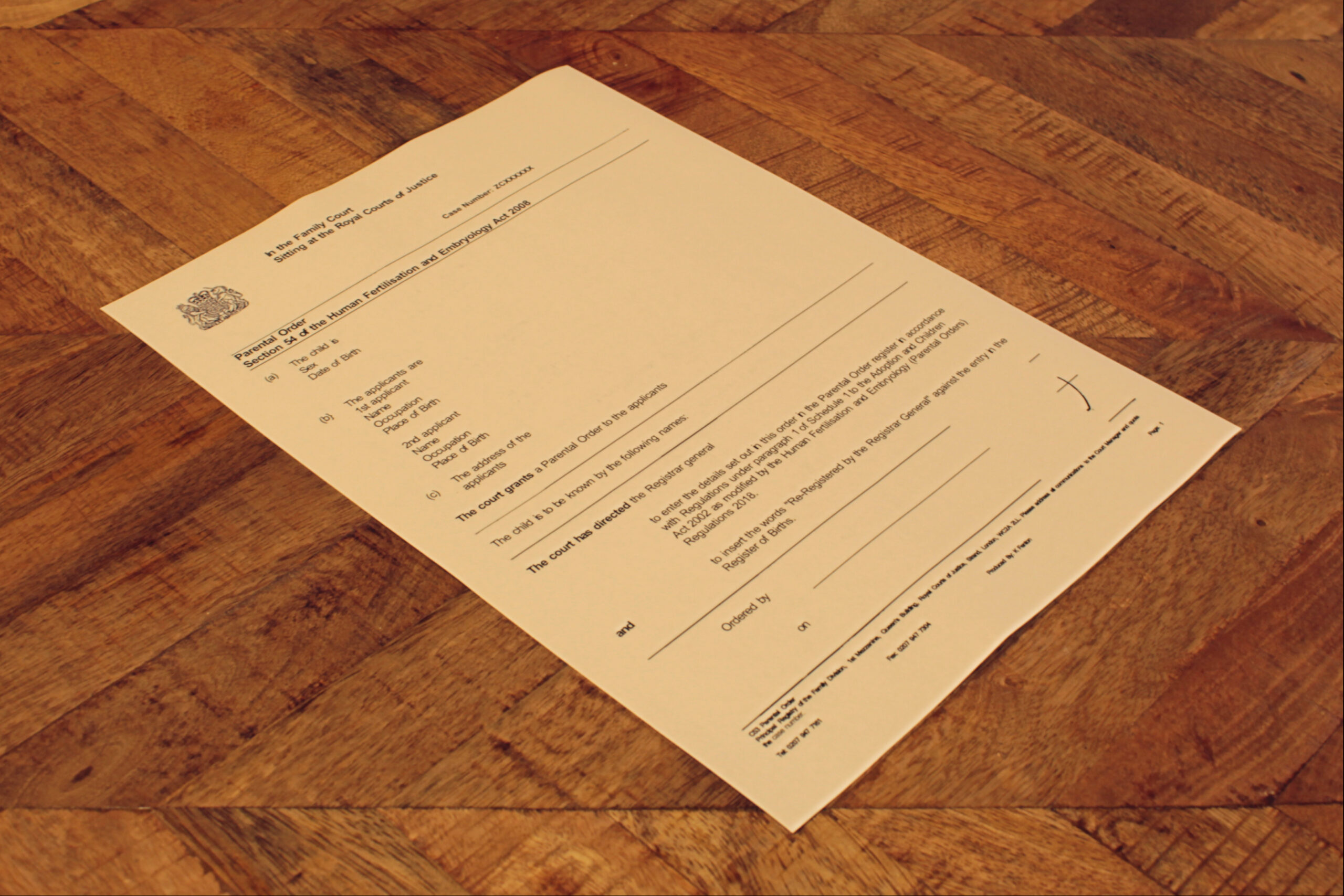It is increasingly common for intended parents to cross borders for surrogacy, to build their families in ways which are impossible or impractical to achieve at home. There is no international framework for regulating surrogacy services, or the recognition of legal parenthood across borders, so managing the legal issues can often feel like assembling a jigsaw.
If you are British or if you live in the UK, you will need to think about managing UK law as well as the law in the country where your child is born (and any other countries involved).
Securing your legal parenthood in the UK
Even if you are your child’s legal parent/s in the country of birth, in the UK your surrogate and her spouse will be your child’s legal parents. If you want to secure your family’s legal status in the UK you will need to make a post-birth court application to the family court in the UK. This is necessary even if you live overseas, if you want to resolve the UK law issues (for example because you plan to move to the UK in the future).
Most UK parents apply for a parental order, which is the legal solution designed to resolve parenthood in surrogacy cases. It is a legal remedy available to parents who have a UK domicile (which can apply to parents living in the UK and parents living overseas, depending on your history and personal circumstances). At the end of the process the court makes an order which triggers the issue of a British birth certificate for your child naming you as the parent/s. Find out more about parental orders.
If you do not qualify for a parental order, perhaps because you do not have a biological connection with your child or because you cannot satisfy the domicile criteria, you may be able to apply for a UK adoption order, or another type of order, instead. Find out more about adoption orders following surrogacy.
British nationality and passports for surrogate babies
Understanding what nationality status your surrogate child will have, what documents you need to leave the country of birth with your child and how long it will take, is a key part of planning any international surrogacy arrangement.
Leaving the USA or Canada with a child born through surrogacy
If your child is born through surrogacy in the USA or Canada, he or she will be born an American/Canadian citizen and you can typically obtain a local passport promptly after the birth. Although there is technically no right to admission on arrival in the UK if a US or Canadian citizen is not travelling as a visitor, in practice UK border authorities routinely admit surrogate children with US and Canadian passports. This gives British parents flexibility to travel home quickly and then to decide whether to make an immediate application for a UK passport or to wait until their parental order is granted. Read our US surrogacy page for the latest updates on what will happen if this changes as a result of President Trump’s efforts to end birthright citizenship in the US.
Post-birth travel from other countries in which your child may be born
In other countries (such as Ukraine and Georgia) most British parents need to apply for a UK passport in the country of birth before they can travel home (unless other routes are available, for example if you have other nationalities). It is important to plan carefully, to make the correct application as soon as possible after the birth, and to be prepared for a stay in the birth country (likely to be several months or more if you are relying on getting your child a UK passport to travel).
Applying for your surrogate child’s UK passport
If you have obtained a parental order (or UK adoption order) from the family court and either of you is British, the application for your child’s UK passport should be straightforward and you will not need to send information about the surrogacy background or consent from your surrogate.
If you don’t yet have a parental order (which will always be the case if you are using a UK passport to take your child out of the country of birth, since the parental order takes 7-10 months and requires you to bring your child to the UK), the UK passport application process is much more complex:
Is your child British? It is possible that your child was born British according to the British Nationality Act 1981 but in many surrogate situations this is not the case, for example if the surrogate is married and/or if the biological father is not British or is British by descent. If your child was not born British, you will need to make an application to the Home Office to ask for your child to be registered as a British citizen using the Home Secretary’s discretionary power and applying its policy on surrogacy. This application has to be granted before a UK passport can be issued for your child.
How do I apply for a UK passport? Whether your child is born British or granted British nationality, you will need to apply to HM Passport Office for a UK passport, disclosing the surrogacy circumstances and sending extensive supporting documentation, including consent from your surrogate.
Emergency passport applications
Emergency passports are intended to be temporary replacement passports, rather than to offer a quicker route to getting a child’s first UK passport. There is some history of them being issued for surrogate babies (for example at the height of COVID travel restrictions and during the early months of the Ukraine war) but they are not routinely available for children born through surrogacy unless there is a genuine and unforseen emergency.
What countries allow surrogacy? Where can I find a surrogate?
The USA is the most common, secure and established international surrogacy destination, accounting for around half of all the children born through overseas surrogacy to UK parents. Surrogacy law in the USA varies according to the State of birth, but it is typical for intended parents to have legal certainty they are their child’s parents, as well as access to well-established professional services to manage the process with strong ethical safeguards.
The second most popular surrogacy destination for UK parents was from 2015 to 2022 Ukraine, which has a legislative framework supporting surrogacy for heterosexual married couples, but of course now very risky given the ongoing war with Russia. The only other places where there is a clear legal framework supporting for surrogacy for foreign intended parents are Canada (open to all family forms) and Georgia (only available to heterosexual couples), although in both there is a shortage of surrogates and other challenges.
Surrogacy programmes are also offered in other countries without clear or well established law. We are currently seeing surrogacy emerging in Central & South America (particularly Mexico and Colombia) and in parts of Africa (including Nigeria, Ghana and Uganda). Europe and Asia are not generally surrogacy destinations, but Northern Cyprus has recently emerged as a hub for a new form of cross-jurisdictional surrogacy (often involving surrogates from Central Asian countries) which has proved ethically concerning and legally problematic. In the past we have seen unregulated surrogacy options emerge and grow rapidly in places like India, Thailand, Nepal, Cambodia and Argentina, which are then shut down very suddenly by government action locally. Embarking on a surrogacy arrangement in an unregulated jurisdiction is therefore a much riskier option, and it is wise to explore the risks, legality and ethics very carefully at the outset.
You may also be considering surrogacy in a country with which you have a personal connection, or where you have a friend or family member who has offered to be your surrogate. In some there is a legal framework for surrogacy but only for intended parents who are resident or domiciled there (such as the UK and South Africa). Elsewhere, surrogacy might be prohibited or there might be no law about it at all. Either way, you will need careful legal advice to make a surrogacy arrangement work safely.
Find out more about international surrogacy by location:
South and Central America surrogacy
Non-UK parents coming to the UK for surrogacy
The UK is not generally a surrogacy destination country for non-UK parents, since you can only get a parental order if one or both of the intended parents is ‘domiciled’ in the UK and because there is generally a shortage of surrogates. However, some non-UK parents do conceive with surrogates in the UK, most commonly where a friend or family member based in the UK acts a surrogate. All such arrangements need very careful legal planning.
Depending on the circumstances, you might need the permission of the UK court to take your child out of the country. In Re G (surrogacy: foreign domicile) 2007, a Turkish couple conceived a child with a British surrogate and was ultimately permitted to take the child to Turkey for adoption there.
The UK’s leading surrogacy lawyers
Find out more about how we support families through surrogacy
Practical help with international surrogacy
Our sibling organisation Brilliant Beginnings offers a fully-managed US surrogacy pathway with integrated UK legal advice from NGA Law
Related articles

Surrogacy in the UK (UK law)
It is, and always has been, legal to enter into a surrogacy arrangement in the UK. However, the legal framework established by the Surrogacy Arrangements Act 1985 does not always make…

Parental orders (surrogacy law)
The intended UK legal solution for resolving parenthood in surrogacy cases is a parental order. This is a post-birth court order which makes the intended parent or parents…

Legal rights in the post-birth period
Since UK law does not recognise the intended parents as the legal parents of their child from birth, there is a period of time during which the family is in legal limbo…
